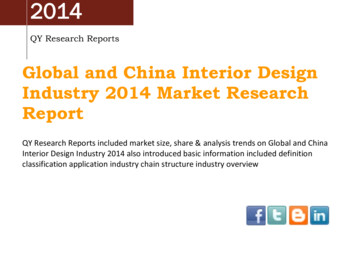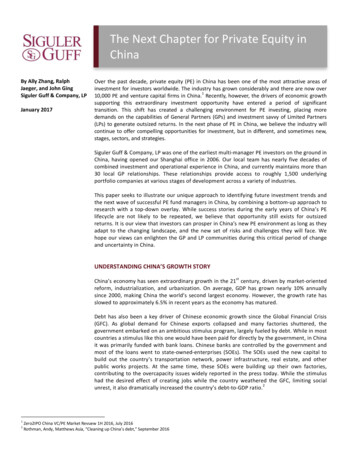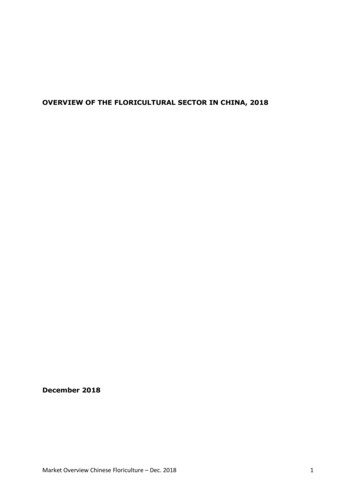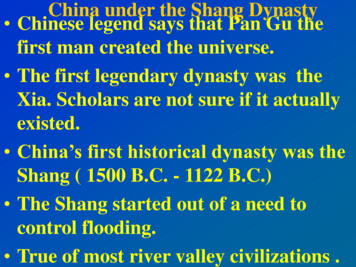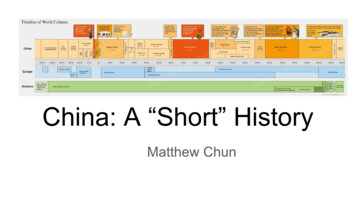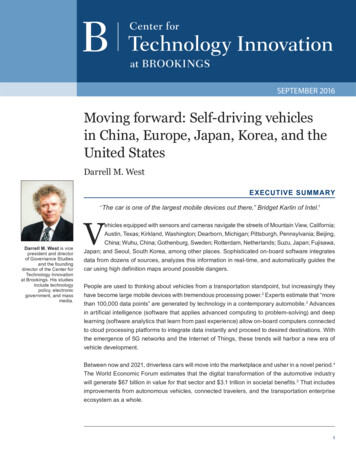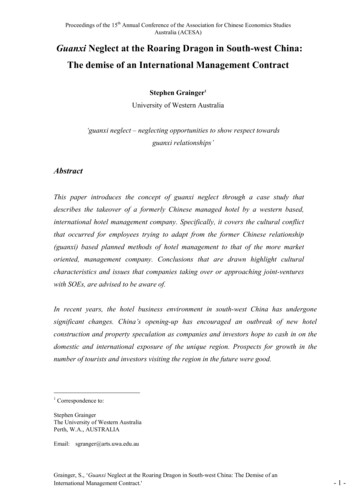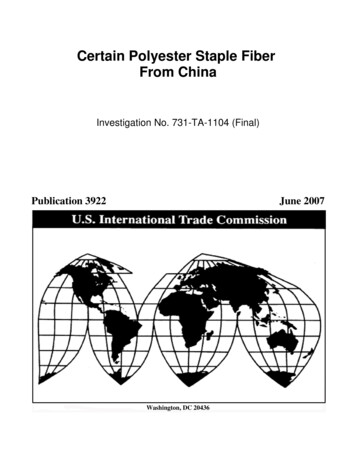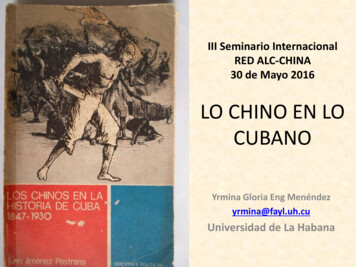
Transcription
May 8, 2020Emily de La Bruyère, principal and research director, Horizon Advisory“Testimony before the U.S.-China Economic and Security Review Commission”China’s Strategic Aims in Africa 1IntroductionThank you to the Commissioners and staff of the US-China Economic and Security ReviewCommission for the opportunity to testify before you today. I lead research at Horizon Advisory,a firm dedicated to parsing China’s international strategies and analyzing their commercial andsecurity implications. We leverage unprecedented open-source empirics on China’s strategicdiscourse and resource allocations to support private sector and government decision-makers.My remarks today will outline Beijing’s strategic ambitions with respect to Africa’s markets andresources; the manner in which those serve the Chinese Communist Party’s (CCP’s) largergeopolitical agenda; and implications for US security and economic strength. I will focus onChina’s application of “Two Markets, Two Resources” to Africa. Beijing seeks asymmetricallyto access and shape foreign markets and resources while protecting its own. In so doing, itacquires one-sided, enduring advantage and leverage. On the African continent, this means thatBeijing works not just to grab, but rather to control resource reserves, markets, industrial supplychains, and standards. Beijing translates control over Africa’s markets, resources, and standardsto influence over the world’s.Already, China’s positioning in Africa threatens American industrial capacity, autonomy, andcompetitive strength: Beijing’s consolidating control over Africa’s mineral and energy resourcesis likely to leave the US dependent – albeit indirectly – on Beijing for critical inputs with fewother suppliers. More subversively, Beijing’s ultimate ambition for Two Markets, TwoResources and for Africa is to set global standards. These threaten to create a world in whichadvanced technological domains, the geo-economic systems that they shape, and America’s rolewithin them, operate on China’s terms.I caution that Beijing is likely to accelerate its ambition in the face of COVID-19, a global crisisthat the CCP has diagnosed as a window of strategic opportunity. In conclusion, I offer a seriesof thematic policy recommendations for Congress. Immediate actions that align with thesesuggestions include: 1Initiating a prioritization logic defining US strategic goals and relative standing, vis-à-visChina, across geographic and functional domains of competition with Beijing, able toinform US public and private investment in Africa and beyond.Guaranteeing that costs are imposed on Beijing in the narrative domain of competition.China regularly overplays its hand in relations with Africa and disregards internationalnorms as it expands its commercial interests. Congress should task US diplomatic,intelligence, and defense agencies to seize opportunities to complicate China’s effortswhere they clearly violate human rights norms and corruption standards.I would like to thank Zachary Shevin for his research assistance and feedback on this testimony.
www.horizonadvisory.org info@horizonadvisory.org Broadening discourse about US portfolio planning – defense and otherwise – to competewith the CCP. China’s global ambitions demand a comprehensive strategic response.Reflexively increasing budget shares for directly responsive geographic security missionsand/or basic research risks playing into Beijing’s asymmetric approach, in Africa andelsewhere. The COVID-19 crisis should accelerate the invigoration of the US strategicapproach to China. Such a reorientation should be informed by the prioritization logicand narrative recommendations cited above.Thank you for this opportunity to contribute to today’s timely and important dialogue alongsidean august crew of expert witnesses.2
www.horizonadvisory.org info@horizonadvisory.orgChina’s Strategic Aims & Evolving Economic Activity in AfricaBeijing sees investment in the African continent as a means to propel its larger national strategy.“It is no mere rhetoric that China needs Africa,” wrote Zhang Hongming (张宏明), DeputyDirector of the Chinese Academy of Social Sciences’s African Studies Institute, in 2017. “Africahas political, economic, and even strategic resources that China uses in order more effectively toexpand its interests – thus turning operations in Africa into a strategic outer line for China’sgeopolitical strategy of great power relations.” 2The Chinese Communist Party’s (CCP’s) interests revolve around three, key, economic3priorities: Africa’s energy and mineral resources,China’s market share in African goods and services, andChinese standards for Africa’s rapidly developing foundational systems – of trade,infrastructure, industry, and politics. 4China’s strategic vision for Africa is a function of both the continent’s natural endowments 5 andits particular stage of development. Beijing sees in Africa’s relatively underdeveloped economic,industrial, and governance environments the chance to acquire, at low cost, strategic footholdswith the potential for high returns. “Most African countries,” explains Zang, “are in the initialstage of industrialization, with abundant natural and human resources, coupled with unresolvedindustrial and market demand. Huge development space creates huge opportunities.” 6Access to Africa’s markets and resources propels China’s economic growth model. Beijing’sindustrial program requires raw materials from abroad. It also requires markets abroad able toabsorb China’s excess goods and capacity, therefore both fueling the PRC’s industrial machineand developing dependence. Beijing in turn uses such dependence – this is a mutuallyreinforcing process – to ensure continued access to global resources and markets.张宏明 [Zhang Hongming]. 中国对非洲战略运筹研究 [China's Strategic Operations Research on Africa ]. 西亚非洲 [West Asia and Africa], 2017.3Or at least those are the “priority demands” in what Zhong describes as “normal situations.” Under “abnormalsituations,” when China faces emergent threats or opportunities, the CCP uses Africa to strengthen its internationalimage and multilateral standing. Zhong cites attacks on China’s human rights abuses in the last decade of the 20 thcentury: “At that time, China made the most of its diplomatic resources in Africa, obtaining international supportfrom African countries.” More recently, he notes, “African countries have expressed their approval for and supportof China’s position in the South China Sea issue.” (张宏明 [Zhang Hongming]. 中国在非洲利益层次分析 [AnAnalysis of China's Interest Level in Africa]. 西亚非洲 [West Asia and Africa], 2016.)4Ibid.5The vast area of Africa contains unique mineral resources and enjoys the reputation of the world's ‘treasure chestof mineral resources,’” wrote Yao Guimei of the Chinese Academy of Social Sciences in 2003. (姚桂梅 [YaoGuimei]. � [Strategic Consideration on Exploitation and Utilization ofAfrican Mineral Resources]. 西亚非洲 [West Africa], 2003.)6张宏明 [Zhang Hongming]. 中国在非洲利益层次分析 [An Analysis of China's Interest Level in Africa]. 西亚非洲 [West Asia and Africa], 2016.23
www.horizonadvisory.org info@horizonadvisory.orgBut Beijing is not simply buying up Africa’s resources or shipping off labor to the continent. InAfrica as globally, China deploys a more nuanced strategy premised on unilateral influence aswell as access. It is not enough to use Africa’s resources. The CCP also aims to govern them,therefore the global supply – and the industries built on it. Similarly, while the PRC values theimmediate returns derived from Africa’s developing markets and industry, those are first-orderambitions. At the next level, the CCP works to determine the supply chains, systems, andstandards – whether rail gauges or fintech – according to which the African continent develops.Two Markets, Two ResourcesThe strategic effort to influence foreign markets and resources – and to use those to enhance thepower of the CCP’s own – is embedded in a decades-old Chinese principle of “Two Markets,Two Resources” (两个市场两种资源). First made official strategy in the late 1990s, “TwoMarkets, Two Resources” refers to the delineation between domestic and international marketsand resources.7 Its intellectual lineage dates back to the CCP’s founding economic leaders. TheChinese market is to be insulated and the global one penetrated; domestic resources are to beprotected and foreign ones siphoned. This is one-sided integration. It promises asymmetricleverage over a globalized system, the ability to obtain without sharing and shape without beingshaped. Two Markets, Two Resources relies on Beijing’s centralized control over its market andcommercial players. The CCP can insulate and guide those according to national strategy wherethe rest of the global ecosystem operates in a fragmented fashion according to short-terminterests.8With this bid to influence global systems – to control global markets and resources – Beijingpositions to circumvent the inherent vulnerabilities of its economic model. The CCP’s industrialprogram fails when prices for imports rise, its export markets dry up, or a challenger with lowercosts improves on its approach. But if Beijing can shape global markets, it can protect againstthat. If Beijing can shape global standards, it can set the terms according to which theinternational economic system operates so that its dominance becomes self-fulfilling.Though seldom discussed in Western sources, the call to leverage “Two markets, TwoResources” is near-ubiquitous in China’s strategic planning. It appears across the StrategicEmerging Industries (战略性新兴产业) Initiative, Made in China 2025 (中国制造 2025), andthe lineage of five year plans. The much-hyped Belt and Road (一带一路) Initiative (BRI) isexplicitly framed as a tool in the global proliferation of Two Markets, Two Resources approach.Africa is a testbed.As Yao Guimei of the Chinese Academy of Social Sciences wrote in 2003, “the developmentand use of African mineral resources is a major strategy to solve the safety and long-term stablesupply of China’s mineral resources under the guidance of the Central Government’s principle of‘using Two Resources and opening Two Markets.’ Those principles are an important part ofEmily de La Bruyère and Nathan Picarsic, Viral Moment: China’s Post-COVID Planning, Horizon Advisory,March 15, 2020, planning8Beijing describes its approach as “State-led, enterprise-driven.”74
www.horizonadvisory.org info@horizonadvisory.orgimplementing China’s global resource strategy. Therefore, we must attach great importance to itand take the initiative to attack.”9 He is explicit about what this entails:China is objectively in a vortex of fierce competition for international resources. In thiscase, if we do not consider China’s economic development of global resources, if we areonly satisfied with the random purchase of mineral products on the international market,we will have to pay higher prices for imported mineral products on the internationalmarket. That price will be readily controlled by others. It is a better policy to go toAfrican countries for exploration, to establish independent mining companies, and togradually set up our own global mineral resources supply guarantee system. Only byactively governing the allocation of international resources and breaking the control ofWestern countries over the world’s strategic resources can we ensure the sustained andstable development of China’s social economy. 10In other words, the idea is not just to trade or purchase Africa’s resources. Doing so would makeBeijing vulnerable to an international market outside of its control. Rather, China is to invest ingovernance over African resource reserves and their production, in doing so to establish Beijingcontrolled “global supply chains and production bases.” 11 The ultimate goal is to leapfrog theUS-led international system. Zhang writes of Beijing’s interests in Africa that “this is a politicalgame between China and Western powers.”12International industry, especially advanced technology, hinges on access to critical mineral andenergy inputs. Many of those have consolidated supply in Africa. Influence over that supplypromises outsized influence on the international industry built on top of it. Africa accounts forapproximately 10 percent of global oil production. It accounts for a supermajority of globalcobalt production. A single African territory accounts for nearly all of global platinum capacity.This resource endowment provides unique opportunity, latent potential, and – with geopoliticalrisk discounted – an absolute, low-hanging, market inefficiency. In rare earths, Beijing’s nearmonopoly of global supply and processing, a function of natural endowments and regulatoryarbitrage, grant economic and security leverage. If Beijing’s is able to secure sufficientdependence through engagement with select African states, the PRC may be able to apply its rareearths playbook to their resources – to critical reserves outside of its borders. Beijing seeks to doso for defensive reasons; for supply chain and resource security. But it also seeks offensive ends:Pricing and market-making power over producers and consumers of critical supplies.And thanks to Africa’s scale, choices of systems and standards on the continent promise to affectglobal systems and standards. At present, Beijing uses the support of African countries in theUnited Nations to resolve multilateral disputes in its favor. If those countries adopt China’s姚桂梅 [Yao Guimei]. � [Strategic Consideration on Exploitation andUtilization of African Mineral Resources]. 西亚非洲 [West Africa], 2003.10姚桂梅 [Yao Guimei]. � [Strategic Consideration on Exploitation andUtilization of African Mineral Resources]. 西亚非洲 [West Africa], 2003.11Ibid.12张宏明 [Zhang Hongming]. 中国在非洲利益层次分析 [An Analysis of China's In
Beijing works not just to grab, but rather to control resource reserves, markets, industrial supply chains, and standards. Beijing translates control over Africa’s markets, resources, and standards to influence over the world’s. Already, China’s positioning in Africa threatens American industrial capacity, autonomy, and competitive strength: Beijing’s consolidating control over Africa .

